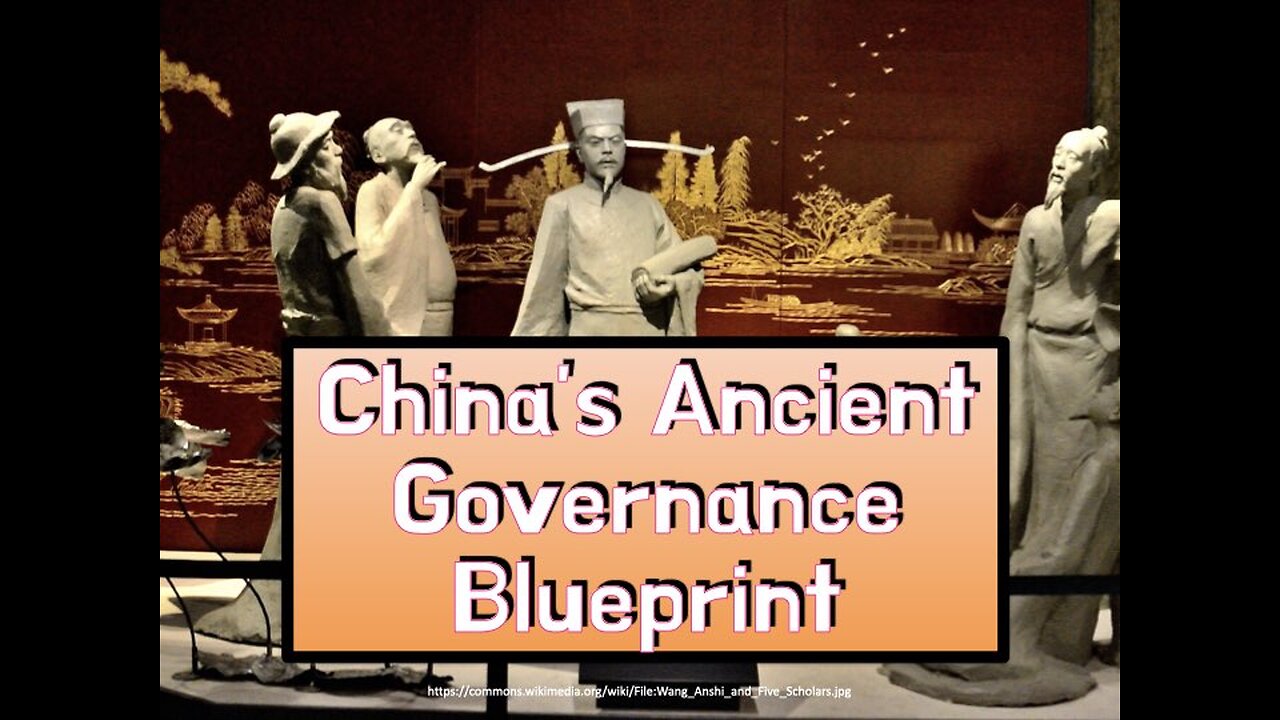Premium Only Content

China's Ancient Governance Blueprint Wang Anshi 王安石
This episode explores the dramatic reforms of Wang Anshi (王安石变法 Wáng Ānshí biànfǎ), one of China’s boldest statesmen of the Northern Song dynasty. Between 1069–1085, Wang introduced sweeping policies — from the Green Sprouts Law (青苗法) and Equal Tax Law (方田均税法) to the Baojia military system (保甲法). His reforms sought to strengthen the state, reduce inequality, and curb elite privilege. But they faced elite resistance, bureaucratic abuse, and over-rapid rollout, ultimately collapsing after the emperor’s death.
Why do Wang Anshi’s policies still matter today? Because many resonate with how the Chinese Communist Party governs — from state market interventions to people-centered development. We ask: what lessons does Wang’s reform offer modern policymakers, and how does his legacy shape China’s governance today?
Join us for a deep dive into history, policy, and politics that bridges the Song dynasty and the 21st century.
Time Codes
00:00 - Wang Anshi
01:44 - Part 1: Background & Social Roots
04:11 - Part 2: The Core Reforms
08:10 - Part 3: Problems and Failures
12:45 - Great Leap Forward(大跃进 Dàyuèjìn)
16:22 - Questions
Open Journal of Historical Studies 历史学研究, 2025, 13(2), 141-151
Published Online April 2025 in Hans. https://www.hanspub.org/journal/ojhs
https://doi.org/10.12677/ojhs.2025.132018
王安石变法中的公共政策研究分析 - 木洁
A Study on Public Policy in Wang Anshi's Reforms - Mu Jie
Wang Anshi Reform 王安石变法, Northern Song, Chinese governance, CCP policy, Green Sprouts Law 青苗法, Equal Tax Law 方田均税法, Baojia 保甲法, Chinese history podcast, policy reform, Song dynasty politics, Xi Jinping governance, Chinese political history, state intervention in economy, public policy China, reform and resistance
Wang Anshi’s Reform (王安石变法 Wáng Ānshí biànfǎ)
冗官 (rǒngguān) — redundant officials
冗兵 (rǒngbīng) — redundant soldiers
冗费 (rǒngfèi) — redundant expenses
Land concentration 土地兼并 (tǔdì jiānbìng)
External threats from 辽 (Liáo) & 西夏 (Xī Xià)
青苗法 (qīngmiáo fǎ) — Green Sprouts loans
经世致用 (jīngshì zhìyòng) — practical learning
Reformed 科举 (kējǔ) to test governance skills
方田均税法 (fāngtián jūnshuì fǎ) — Equal Tax Law
均输法 (jūnshū fǎ) — State trade redistribution
市易法 (shìyì fǎ) — Market price stabilization
免役法 (miǎnyì fǎ) — Labor tax reform
保甲法 (bǎojiǎ fǎ) — community militia system
将兵法 (jiāngbīng fǎ) — fixed local armies
保马法 (bǎomǎ fǎ) — households caring for state horses
执行偏离 (zhíxíng piānlí) — abuse in implementation
精英反对 (jīngyīng fǎnduì) — elite resistance
求治太急 (qiú zhì tài jí) — reform too hasty
State intervention in economy → 市场调控 (shìchǎng tiáokòng)
People-centered governance → 以人民为中心 (yǐ rénmín wéi zhōngxīn)
Anti-elite policies → echoes of 反腐 (fǎnfǔ) campaigns
-
 LIVE
LIVE
The Mel K Show
57 minutes agoMel K & Jovan Hutton Pulitzer | For Reasons of National Security: The 2020 Election Audit Continues
443 watching -
 LIVE
LIVE
LFA TV
19 hours agoBREAKING NEWS ALL DAY! | THURSDAY 9/25/25
4,616 watching -
 LIVE
LIVE
Trumpet Daily
38 minutes agoTrumpet Daily LIVE | Sept. 25, 2025
413 watching -
 1:55:17
1:55:17
Benny Johnson
2 hours agoPANIC: James Comey Indictment IMMINENT, Faces PRISON | Letitia James, John Bolton Next, Trump CURSE
35.4K29 -
 1:00:18
1:00:18
VINCE
3 hours agoHow Many More Tragedies Before A Change Is Made? | Episode 133 - 09/25/25
238K97 -
 1:14:02
1:14:02
theoriginalmarkz
2 hours agoCoffee with MarkZ. 09/25/2025
10.3K2 -
 2:04:20
2:04:20
Badlands Media
8 hours agoBadlands Daily: September 25, 2025
36.9K19 -
 LIVE
LIVE
The Big Mig™
3 hours agoEpstein Was CIA & Who Is Trump Protecting?
5,758 watching -
 DVR
DVR
Chad Prather
1 hour agoChristian Youth Coach SHOT In Texas While Praying W/ Team! + Megyn Kelly DESTROYS Libs On TPUSA Tour
11K12 -
 1:45:33
1:45:33
Dear America
3 hours agoPOLITICAL VIOLENCE MUST END!! First Charlie, Now ICE…
144K52